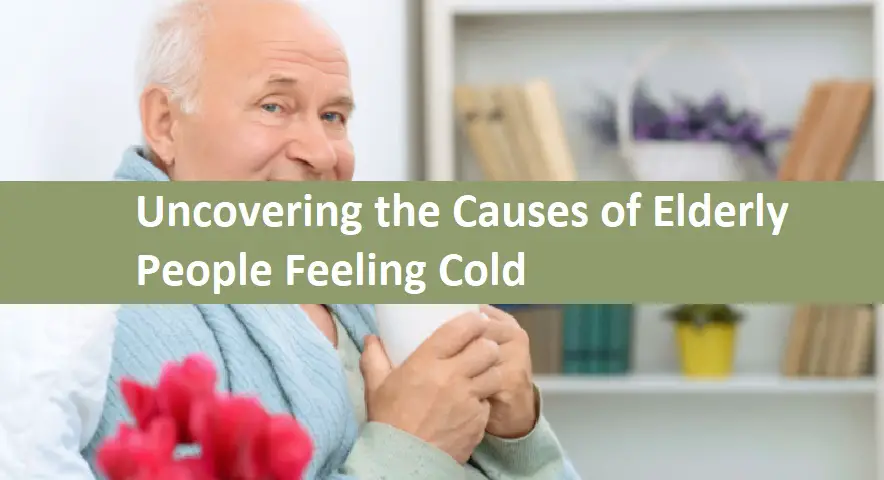For many elderly people, feeling cold all the time is a common experience. But what causes this discomfort? In this blog post, we’ll explore what might be causing an elderly person to have this sensation and discuss some potential solutions. We’ll also look at what we can do as caregivers to help an elderly person constantly feeling cold. Join us as we uncover the causes of why an elderly person might feel cold all the time.
Explaining Hypothermia
Hypothermia is when an elderly person’s body temperature gets too low. This can be a serious health concern, especially in the winter when temperatures outside are cold, and snow or ice may be present. Hypothermia can lead to confusion, sleepiness, shallow breathing, and even death if not treated quickly. Fortunately, many hypothermia cases can be prevented by dressing warmly and avoiding prolonged exposure to cold temperatures.
Factors Affecting the Elderly People Feeling Cold
The elderly can be more prone to feeling cold than younger adults due to a combination of physical, medical, and lifestyle factors.
Common Factors
- A decrease in muscle mass and fat as a person ages makes them feel colder.
- Elderly people with certain medical conditions, such as anemia, may experience feeling cold more frequently.
- Nutrition is important for regulating body temperature; if an elderly person isn’t eating enough or doesn’t have the right balance of healthy foods, they may feel colder.
- Elderly people often have slower metabolism rates, which can lead to feeling cooler.
- Poor circulation due to medical conditions such as diabetes or hardening of the arteries can cause an elderly person to experience extreme cold.
- Environmental factors, such as living in a drafty home or spending extended periods outdoors in cold weather, can also affect how an elderly person feels about temperature.
Medical Factors Affecting the Seniors
Feeling cold frequently might indicate an underlying medical condition. Conditions linked to feeling cold regularly include:
- Thyroid problems, such as hypothyroidism, can cause low body temperature.
- Anemia, or a decrease in red blood cells, can lead to poor circulation and feeling cold.
- Diabetes, which can cause nerve damage and reduced blood flow.
- Chronic obstructive pulmonary disease (COPD) can lead to difficulty breathing and feeling cold.
- Autoimmune disorders such as lupus and arthritis can cause inflammation throughout the body.
Signs of Hypothermia
If an elderly person experiences any of the following symptoms, they may be suffering from hypothermia:
- Shivering or feeling very cold to the touch.
- Confusion and difficulty speaking.
- Slowed breathing rate or shallow breaths.
- Fatigue and drowsiness.
- Loss of coordination and balance.
- Bluish or pale skin color.
Solutions for Elderly People Feeling Cold
As caregivers, there are many things we can do to help an elderly person who is feeling cold all the time. Here are a few ideas:
- Ensure the individual is dressed appropriately for the season. Layer clothing to retain body heat and wear a hat, scarf, and gloves outside during colder months.
- Make sure the elderly person gets enough of the right foods, as proper nutrition can help regulate body temperature.
- If an elderly person has poor circulation, suggest wearing compression stockings or using heating pads to help keep them warm.
- Consider installing a thermostat in the home to keep a consistent temperature and reduce drafts.
- Monitor any medications the elderly person is taking, as some can cause them to feel colder than normal.
- If an elderly person is living alone, check on them regularly to ensure they are dressing appropriately and taking steps to stay warm.
Conclusion
Feeling cold all the time can be a sign of an underlying medical condition, so it’s essential to be aware of the risks associated with hypothermia in elderly people. Taking steps to ensure an elderly person is dressed properly for the weather, eating a healthy diet, and having regular check-ins can help reduce their risk of hypothermia. It’s also important to monitor their medications and look for signs of hypothermia, such as shivering or slow breathing. Taking the necessary precautions can help elderly people stay safe and warm during colder months.

Morgan Elfman is a compassionate writer, dedicated caregiver, and passionate advocate for senior well-being. Born and raised with a deep sense of empathy and a natural inclination towards service, Morgan has devoted her life to making a positive impact on the lives of seniors.
As a writer for www.choiceseniorlife.com, Morgan utilizes his skills to create insightful and informative content that addresses the unique needs and challenges faced by seniors and their families. Her articles not only provide valuable information on health, lifestyle, and care options but also strive to inspire and empower seniors to lead fulfilling lives.

